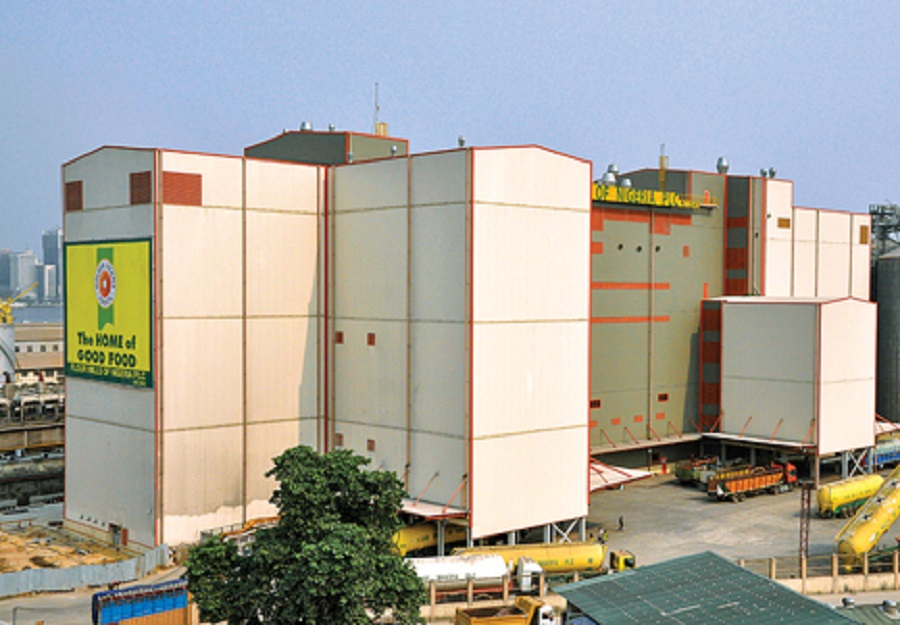Economy
Flour Mills Increases Dividend Payout by 30% as Revenue Hits N1.2trn

By Dipo Olowookere
The board of Flour Mills of Nigeria Plc is proposing to pay shareholders of the company a dividend of N2.15 per unit for its 2022 financial year, which ended on March 31, 2022. This amount is higher than the N1.65 paid in the previous accounting period, reflecting an increase in dividend payout by 30.3 per cent.
The firm, in its audited results released on Tuesday, said the year under review was profitable as the pre-tax profit jumped by 10.48 per cent to N41.1 billion from N37.2 billion, while the net profit appreciated by 8.95 per cent to N28.0 billion from N25.7 billion, with the earnings per share (EPS) at N6.26 compared with the previous year’s N6.38.
Analysis of the results revealed that in the fiscal year, Flour Mills posted an annual turnover of N1.2 trillion in contrast to the N771.6 billion achieved a year earlier and this was largely due to improvement in the earnings from the sale of goods. It also recorded a significant improvement in income from the services it rendered in the period under consideration as it accounted for N45.6 billion versus the N29.2 billion earned from the same income stream in 2021, which is mainly from support services.
From the revenue generated in FY 2022, the food business raked in N748.8 billion versus N478.3 billion last year, the agro-allied business, which involves the sale of Golden Penny Vegetable Oil, Soya Oil and Margarine products, the company generated N213.4 billion as against the N139.4 billion a year earlier, while the sugar arm of the organisation contributed N156.0 billion to the total earnings compared with the N124.6 billion in FY 2021.
However, Business Post observed that despite the 55.6 per cent increase in the gross earnings for the year, the gross profit only moved higher by 1.2 per cent to N108.1 billion from N106.8 billion.
This was largely due to the higher cost of sales as it finished the year at N1.1 trillion compared with the N664.9 billion in the previous year.
A chunk of this was the higher cost of raw and packing materials (N958.0 billion versus N583.6 billion in 2021), an increase in fuel and oil to N23.1 billion from N17.8 billion, a jump in factory repairs and maintenance to N16.1 billion from N11.8 billion and an increase in other production expenses to N12.5 billion from N8.6 billion.
A further look into the financial statements showed that Flour Mills was able to cut down its selling and distribution expenses to N11.1 billion from N12.1 billion, but the administrative costs rose to N31.8 billion from N29.1 billion, leaving the company with an operating profit of N65.5 billion in contrast to N52.2 billion in the previous accounting year.
Economy
Lagos Lists N230bn Series 4 10-Year Bond on Stock Exchange

By Aduragbemi Omiyale
The N230 billion 10-year bond issued to investors by the Lagos State government has been listed on the Nigerian Exchange (NGX) Limited.
It was the Series 4 of the state government’s N1 trillion Debt and Hybrid Instruments Issuance Programme, which was sold at a coupon rate of 16.25 per cent.
It was offered for sale to bondholders in November 2025, with Chapel Hill Denham Advisory Limited as the leading issuing house and bookrunner.
The joint issuing houses and bookrunners were Asset & Resources Management Limited, Capital Bancorp Plc, Cardinal Stone Partners Limited, Cedrus Capital Limited, Comercio Partners Capital Limited, Cordros Advisory Services Limited, Coronation Merchant Bank Limited, Dynamic Portfolio Limited, FCMB Capital Markets Limited, FCSL Asset Management Company Limited, FirstCap Limited, G.A. Capital Limited, LeadCapital Plc, Light House Capital Limited, Phoenix Global Capital Markets Limited, Quantum Zenith Capital and Investments Limited, Radix Capital Partners Limited, SFS Financial Services Limited, Stanbic IBTC Capital Limited, United Capital Plc, and, Vetiva Advisory Services Limited.
The debt instruments are callable at par after 60 months, on any coupon payment date, subject to the issuer having obtained prior regulatory approvals and upon issuance of the requisite notice to bondholders.
Business Post reports that the bond was sold at a unit price of N1,000, with the interest to be paid to investors on every May 20 and November 20 until maturity.
According to the Governor of Lagos State, Mr Babajide Sanwo-Olu, proceeds from the exercise would be used for critical infrastructure in transportation, housing, the environment, healthcare, education, urban renewal, and the provision of other sustainable infrastructure that would serve the future needs of the state.
The listing of the debt instrument on the stock exchange today, Monday, February 9, 2026, allows investors to trade the bond at the secondary market.
Economy
CBN to Begin 304th MPC Meeting February 23

By Adedapo Adesanya
The Central Bank of Nigeria (CBN) has announced plans to hold its 304th Monetary Policy Committee (MPC) meeting on Monday, February 23 and Tuesday, February 24, 2026.
This information was disclosed in a circular published on the apex bank’s official website on Monday. This will be the first meeting of 2026.
The gathering comes amid sustained efforts by the CBN to rein in inflation, stabilise the foreign exchange market, and strengthen macroeconomic conditions.
At its last MPC meeting in November 2025, the central bank retained the Monetary Policy Rate (MPR) at 27 per cent, maintaining its restrictive posture in a bid to curb inflationary pressures and stabilise the foreign exchange (FX) market.
The MPC is one of the bank’s highest policy-making bodies, responsible for formulating monetary and credit policies aimed at ensuring price stability.
Through key instruments such as the MPR, Cash Reserve Ratio (CRR), and Liquidity Ratio (LR), the committee guides interest rate conditions and overall monetary direction in the economy.
Comprising the CBN Governor, Deputy Governors, Board members, and appointed external members, the committee meets periodically to review critical economic indicators, including inflation, gross domestic product, and exchange rate developments, before taking policy decisions.
The apex bank outlined the timetable and venue in its official notice.
“The 304th meeting of the Monetary Policy Committee (MPC) is scheduled to hold as follows,” the CBN said.
“Day 1: Monday, February 23, 2026 – Time: 10.00 a.m.”
“Day 2: Tuesday, February 24, 2026 – Time: 8.00 a.m.”
According to the circular, the meeting will take place at the MPC Meeting Room on the 11th floor of the CBN Head Office in Abuja.
Economy
NGX Lifts Suspension on Fortis Global Insurance

By Aduragbemi Omiyale
The suspension placed on trading in the shares of Fortis Global Insurance Plc has been lifted by the Nigerian Exchange (NGX) Limited after six years.
The embargo arose from the company’s violation of Rule 3.1: Rules for Filing of Accounts and Treatment of Default Filing (Default Filing Rules).
The underwriting firm, formerly known as Standard Alliance Insurance Plc, was suspended by the exchange on July 2, 2019, after the board failed to file the necessary financial statements.
Rule 3.1 provides that if an issuer fails to file the relevant accounts by the expiration of the cure period, the exchange will: a) send to the issuer a second filing deficiency notification within two business days after the end of the cure period, b) suspend trading in the issuer’s securities, and c) notify the Securities and Exchange Commission (SEC) and the market within 24 hours of the suspension.
A notice from the bourse last week disclosed that the company has now filed all outstanding financial statements due to the NGX, and in view of this, the embargo has been lifted pursuant to Rule 3.3 of the Default Filing Rules.
This section states that, “The suspension of trading in the issuer’s securities shall be lifted upon submission of the relevant accounts, provided the exchange is satisfied that the accounts comply with all applicable rules of the exchange.
“The exchange shall thereafter also announce through the medium by which the public and the SEC were initially notified of the suspension, that the suspension has been lifted.”
The bourse informed trading license holders and the investing public “that the suspension placed on trading on the shares of Fortis Global Insurance was lifted on Wednesday, February 4, 2026.”
-

 Feature/OPED6 years ago
Feature/OPED6 years agoDavos was Different this year
-
Travel/Tourism9 years ago
Lagos Seals Western Lodge Hotel In Ikorodu
-

 Showbiz3 years ago
Showbiz3 years agoEstranged Lover Releases Videos of Empress Njamah Bathing
-

 Banking8 years ago
Banking8 years agoSort Codes of GTBank Branches in Nigeria
-

 Economy3 years ago
Economy3 years agoSubsidy Removal: CNG at N130 Per Litre Cheaper Than Petrol—IPMAN
-

 Banking3 years ago
Banking3 years agoSort Codes of UBA Branches in Nigeria
-

 Banking3 years ago
Banking3 years agoFirst Bank Announces Planned Downtime
-

 Sports3 years ago
Sports3 years agoHighest Paid Nigerian Footballer – How Much Do Nigerian Footballers Earn

















